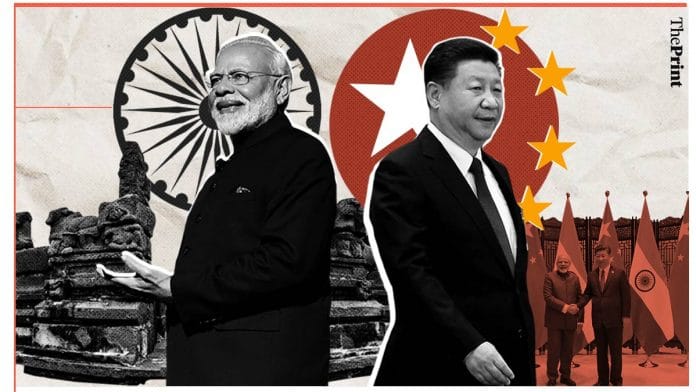India’s Lok Sabha election is garnering significant global attention – more from China than any other nation. Discussions in think tanks and on state-owned news platforms and social media show Beijing has its eyes trained on New Delhi’s election proceedings. Expectedly, given how swiftly their relationship has plummeted over the past four years.
The Modi administration’s emphasis on resolving the border dispute with China contrasts sharply with Beijing’s approach of relegating it to the background. China has employed the border dispute and standoffs as leverage against India while simultaneously urging the nation to prioritise other aspects of bilateral ties. This disparity in focus raises apprehensions in China about the trajectory of future relations under (a potentially re-elected) Modi government.
Interestingly, Xu Feihong recently assumed the position of China’s Ambassador to India following a 1.5-year vacancy. The appointment, which coincided with the Indian general elections, is being highlighted in Chinese media as ‘an opportunity’ for the country to improve ties with Beijing.
Also read: China’s revised State secret law shows its insecurity. It solidifies Xi’s legacy
China’s misplaced narratives
State-owned English news portals such as the Global Times have adopted a hawkish stance on India and its elections. The Chinese media house is crafting a narrative that suggests the Modi-led BJP is fanning anti-China sentiments to gain votes. Global Times has published several editorial and opinion articles attributing the deterioration in India-China relations to government rhetoric aimed at securing votes. It has criticised Indian media for allegedly aligning their narrative with the Modi administration’s China policy and creating an unfavourable perception of the country. Chinese search engines and other websites are also propagating similar stances.
Microblogging platform Weibo is particularly abuzz with such discourse. Many users are saying that Modi is escalating the issue of India’s border tensions with China to foster internal cohesion and attract international support. There is a perception that the Prime Minister is attempting to bolster his image in the election season by taking a firm stance against China. This includes highlighting contentious issues such as India’s role in the South China Sea dispute.
In contrast, some Chinese scholars and analysts offer relatively moderate perspectives that deviate from mainstream media narratives. Zhang Jiadong from Fudan University recently attracted attention with his analyses, where he acknowledged India’s strides in economic development and social governance. He also recognised the country’s realisation of its great power status.
However, Liu Zongyi, director of the Center for South Asia Studies at the Shanghai Institute of International Studies, posits that Hindu nationalism is steadily gaining prominence among the majority of people in India, which is also affecting voting patterns. He contrasted this with the previous Congress governments, which, according to him, did not emphasise Hindu nationalism and was also friendlier toward China. Lin Minwang from the Institute of International Studies at Fudan University emphasised that if Modi secures re-election, the primary reason would be his infusion of religion into India’s political landscape.
Another commentary said that India’s young Hindu voters perceive Modi as a deity-like figure and firmly believe that he alone can guide the nation toward prosperity and elevate the country’s global status beyond China and the United States. Additionally, it highlights the deep-rooted perception of a China threat within India, which contributes to New Delhi’s lack of cooperation and outreach toward Beijing. Long Xingchun from the Chongyang Institute for Financial Studies of Renmin University argued in a past commentary that the combination of Sinophobia and Indian nationalism is detrimental to India-China relations.
Similar views were shared by Ning Shengnan of the China Institute of International Relations, who said Modi vigorously promoted Hindu nationalism during his two terms. She, however, also praised the Indian PM as a strong leader, stressing that his governance style changed his country’s ‘weak’ image. She further said that if India wants to truly focus on its development after the elections, it needs a peaceful external environment sans conflict with China.
Also read: US-Japan-Philippines trilateral isn’t just about development. China is at its core
‘China India’s priority’
However, there is consensus that China will remain a key priority for India after the 2024 Lok Sabha election. At least the Chinese scholarly discourse primarily leans toward optimism, offering several recommendations for shaping the future of India-China relations.
A broader understanding of India in China, however, appears largely misconstrued. While the border dispute has influenced some Indians’ perceptions, it has not yet emerged as a decisive factor in the country’s election. Uncertainty looms over whether the hardline approach toward China will persist or if there will be room for reconciliation.
China must rectify its understanding of India; New Delhi’s expressions of concern are not merely political rhetoric but genuine apprehensions that demand acknowledgement and resolution from Beijing. Until India’s sovereignty is respected, meaningful progress may remain elusive in bilateral relations.
Sana Hashmi is a fellow at the Taiwan Asia Exchange Foundation and George H W Bush Foundation for US-China Relations. She tweets @sanahashmi. Views are personal.
(Edited by Zoya Bhatti)






